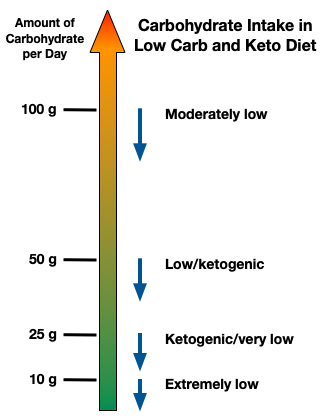Intake Levels: Low Carbohydrate vs. Ketogenic Diet
Every person is different, and their metabolism and the way they handle carbohydrates vary considerably. There is however, general consensus about the approximate levels of carbohydrate intake.
Carbohydrate intake includes all sugars and starches. To reduce carbohydrate intake all high starch and sugar foods need to be avoided, including bread, pasta, rice, potatoes, tropical fruits, starchy root vegetables, some nuts such as cashews and drinks containing sugar.
For weight loss and remission of mild to moderate insulin sensitivity, most people will start to gain benefit once they reduce their daily carbohydrate intake below 100g a day. Some may have to go lower to 50g per day to achieve this. To get into a ketogenic state, where your metabolism is using fats for fuel instead of glucose, most people need to go below 50g per day and some below 25g per day.
However some people with severe insulin resistance or particular metabolic states will need to go below 10g per day to remain in ketosis.

Further Reading:
Dietary strategies for remission of type 2 diabetes: A narrative review. Adrian Brown,
Paul McArdle, Julie Taplin, David Unwin, Jennifer Unwin, Trudi Deakin, Sean Wheatley, Campbell Murdoch, Aseem Malhotra, Duane Mellor. Journal of Human Nutrition and Dietetics: The Official Journal of the British Dietetic Association, 2022;35(1):165-178.
https://onlinelibrary.wiley.com/doi/pdfdirect/10.1111/jhn.12938
Dietary carbohydrate restriction as the first approach in diabetes management: critical review and evidence base. Feinman RD, Pogozelski WK, Astrup A, Bernstein RK, Fine EJ, Westman EC, et al. Nutrition. 2015;31(1):1–13.
https://curis.ku.dk/ws/files/153416431/Feinman_et_al_Nutrition_Vol_31_1_1_13.pdf
Contact me

 What is a Low Carb Diet
What is a Low Carb Diet